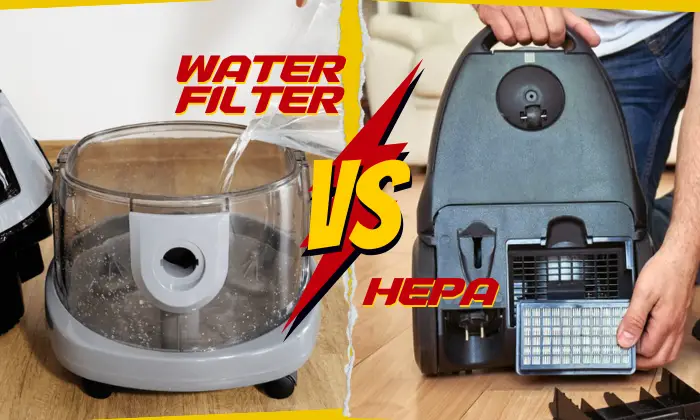Vacuum cleaner water filter and hepa both remove dust particles. However, hepa filters are more efficient in removing smaller particles as small as 0.3 microns.
Compared to Vacuum Cleaner Water Filter vs HEPA, the water filters only effectively remove larger particles above 0. 5 microns and require constant maintenance, refilling, and emptying. When it comes to choosing between a vacuum cleaner water filter and a hepa filter, it is essential to understand the differences between the two.
Vacuum cleaner water filters work by trapping dust particles in a water-filled container and require constant maintenance, whereas hepa filters capture smaller particles and are more efficient. This article will delve into the differences between vacuum cleaner water filters and hepa filters, outlining the advantages and disadvantages of each type to help you make an informed decision.

- Understanding Vacuum Cleaner Water Filters
- Exploring HEPA Filters
- Comparing Cleaning Performance
- Allergen Removal
- Maintenance and Cost
- Noise Level
- Portability and Design
- Environmental Impact
- Choosing the Right Vacuum Cleaner for You
- How To Maintain And Clean Your Vacuum Cleaner Filters
- FAQs On Vacuum Cleaner Water Filter Vs Hepa
- What Is A Vacuum Cleaner Water Filter And How Does It Work?
- What Is Hepa And How Does It Work?
- Which One Is Better For Allergy Sufferers, Vacuum Cleaner Water Filter Or Hepa?
- What Are The Benefits Of Using A Vacuum Cleaner Water Filter?
- What Are The Drawbacks Of Using A Vacuum Cleaner Water Filter?
- What Are The Drawbacks Of Using A Hepa Filter?
- Conclusion
Understanding Vacuum Cleaner Water Filters
1. How Water Filtration Works
Vacuum cleaners equipped with water filters use water as a filtration medium. As the air and dust are sucked into the vacuum, they pass through a water chamber, where particles are trapped and held within the water. Clean, moist air is then released back into the environment.
2. Pros of Water Filters
- Effective Allergen Removal: Water filters are excellent at trapping allergens, making them a great choice for allergy sufferers.
- No Need for Replacements: Unlike HEPA filters, water filters can be cleaned and reused, reducing long-term costs.
- Improved Air Quality: The moist air released is often cleaner and more humidified, benefiting indoor air quality.
3. Cons of Water Filters
- Bulky and Heavy: Vacuum cleaners with water filters tend to be larger and heavier, making them less maneuverable.
- Messy Maintenance: Emptying and cleaning the water chamber can be messy, and if not done properly, it may lead to mold growth.
Exploring HEPA Filters
1. How HEPA Filtration Works
HEPA stands for High-Efficiency Particulate Air! HEPA filters are designed or being made to capture tiny particles, including dust, pollen, and pet dander. They use a dense, pleated material to trap particles as air passes through.
2. Advantages of HEPA Filters
- Exceptional Particle Filtration: HEPA filters are incredibly efficient at capturing even the smallest particles/dirts, making them ideal for those with severe allergies.
- Compact and Lightweight: Vacuum cleaners with HEPA filters are often more compact and easier to maneuver.
- Low Maintenance: While HEPA filters need replacement, it’s less frequent than cleaning water filters.
3. Limitations of HEPA Filters
- Replacement Costs: Over time, the cost of replacing HEPA filters can add up.
- Less Humidification: Unlike water filters, HEPA filters do not add moisture to the air.
Comparing Cleaning Performance
When it comes to cleaning performance, both water filters and HEPA filters excel in different ways. Water filters better trap allergens, while HEPA filters are more efficient at capturing fine particles. Your choice should depend on your specific cleaning needs.
Allergen Removal
If allergies are a significant concern, a vacuum cleaner with a water filter is a smart choice. The moist filtration process effectively traps and removes allergens, relieving allergy sufferers.
Maintenance and Cost
Consider your long-term budget and maintenance preferences. Water filters require occasional cleaning but no replacement costs, while HEPA filters need replacement but less frequent maintenance.
Noise Level
Vacuum cleaners with HEPA filters are tend to be quieter due to their compact design. If noise is a concern, HEPA-filtered vacuums may be the way to go.
Portability and Design
For those who value portability and ease of use, HEPA-filtered vacuum cleaners are typically lighter and more maneuverable. Water-filtered vacuums are bulkier and may be challenging to navigate in tight spaces.
Environmental Impact
If you’re environmentally conscious, consider that water filters generate less waste, as they are reusable. HEPA filters need regular replacement, contributing to more filter waste.
Choosing the Right Vacuum Cleaner for You
Ultimately, the choice between a vacuum cleaner with a water filter and one with a HEPA filter depends on your specific needs. If you prioritize allergen removal, water filtration may be your best bet. If compactness and particle filtration are more critical, HEPA filters are the way to go.
How To Maintain And Clean Your Vacuum Cleaner Filters
Proper cleaning and maintenance of your vacuum cleaner filters is essential for their longevity and effectiveness. When it comes to vacuum cleaner filters, you can choose between the water and HEPA filters. Each of these filters needs regular cleaning to function correctly.
The cleaning schedule for your filters depends on their usage frequency. Avoid washing the hepa filter with water, but instead use a dry cleaning method. Additionally, please read the manufacturer’s instructions before washing your filters, and never let them sit too long without being washed.
Maintaining your vacuum cleaner filters is the key to their longevity, effectiveness, and your home’s cleanliness.

FAQs On Vacuum Cleaner Water Filter Vs Hepa
What Is A Vacuum Cleaner Water Filter And How Does It Work?
A vacuum cleaner water filter is a filtering system that utilizes the power of water to trap dirt and debris. When a vacuum cleaner sucks in debris-filled air, it passes through the water filter, where the water traps the dirt and dust, leaving cleaner air to exit through the exhaust.
What Is Hepa And How Does It Work?
Hepa stands for high-efficiency particulate air, and a hepa filter utilizes a fine mesh material to trap small particles that can cause allergies, such as pollen, pet dander, and dust mites. The particles stick to the surface of the filter or get caught in its fibers, leaving cleaner air to be released back into the room.
Which One Is Better For Allergy Sufferers, Vacuum Cleaner Water Filter Or Hepa?
Both vacuum cleaner water filter and hepa are effective at trapping allergens. However, hepa filters are more efficient at trapping small particles that can cause allergies, and therefore they may be a better choice for allergy sufferers. Vacuum cleaner water filters are better at trapping larger particles.
What Are The Benefits Of Using A Vacuum Cleaner Water Filter?
Vacuum cleaner water filters are beneficial because they trap dust, dirt, and germs in the water, so they are not released back into the room. They also tend to have a longer lifespan because they don’t require frequent replacement, making them cost-effective in the long run.
What Are The Drawbacks Of Using A Vacuum Cleaner Water Filter?
One of the main drawbacks of using a vacuum cleaner water filter is that they can be messy to clean up after use. They are also bulky and require more space to store. Additionally, they may not be as effective as hepa filters at trapping small particles that can cause allergies.
What Are The Drawbacks Of Using A Hepa Filter?
One of the main drawbacks of hepa filters is that they can be expensive to replace, making them less cost-effective in the long run. Additionally, they may not be as effective at trapping larger particles as vacuum cleaner water filters.
Hepa filters also require regular replacement to maintain their efficiency.
Conclusion
Choosing between a vacuum cleaner water filter and a HEPA filter can be tough. It ultimately depends on your specific needs and budget. If you are looking for a filter that can effectively trap small particles like pollen and dust mites, a hepa filter might be the best option.
On the other hand, a water filter may be a better choice for those who want to eliminate allergens, pet dander, and even bacteria as it provides a multi-stage filtration system. However, it’s important to keep in mind that water filters require more maintenance and can be more time consuming to clean than traditional hepa filters.
Be sure to weigh the pros and cons of each filter before making a final decision on which one to purchase.




